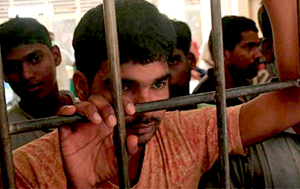 New Delhi, Feb 28: Three men have confessed in a Saudi Arabian court that they buried alive five Asian men — suspected to be Indians — on a farm in an eastern province of the kingdom four years ago, local media reported.
New Delhi, Feb 28: Three men have confessed in a Saudi Arabian court that they buried alive five Asian men — suspected to be Indians — on a farm in an eastern province of the kingdom four years ago, local media reported.
The crime, committed in 2010, came to light after skeletons were discovered during digging on the farm.
According to a report published on Friday in the English language Arab News, 25 people have been arrested in connection with the killings in Qatif four years ago. Three of the suspects had confessed in court on Wednesday to torturing the workers for hours before then burying them alive, Arab News said.
The suspects include both Saudi nationals and expatriates, the report said.
Government sources in New Delhi said it could not be confirmed immediately whether the victims were Indians. After the case was reported in the local media, the Indian deputy chief of mission in Riyadh, Sibi George, met the local police chief to ascertain the identities of the victims, the sources said.
“It cannot be said with certainty that they were Indians because the local police have not confirmed their identities yet in writing. They have told our embassy officials that they would conduct DNA tests on the remains.
Our embassy is in constant touch with their foreign office,” a senior official told The Indian Express.
According to the Arab News report, a tenant on the farm stumbled upon the decomposing remains while clearing the land. “Investigators then found an engraved gold ring and residence cards that helped them to identify some of the victims and several suspects. The bodies were found with ropes around their arms and legs, and the their mouths filled with cotton and covered with duct tape,” the report said.
An unidentified man, who had been asked by a “friend” to reach the farm, is said to have given graphic details of the incident in his confession.
“We saw five workers with their hands tied in the seating area. When the friend with me asked why they were tied, our host said that one of them had sexually harassed his sponsor’s daughter and other women… I saw that the five Indian workers were tied and unconscious, just before we went to another room to drink alcohol and smoke hashish. While we were drinking, I heard one of them screaming so I went out and slapped him in the face,” the report quoted him as saying.
“Later the friend who came with me left the room with a stick and hit the worker until he bled. We then took them all into another room… The three of us continued beating the workers on different parts of their bodies while continuing to drink and smoke… We kept drinking, smoking and beating them.
“Our host suggested we bury them alive in a hole behind the entrance gate of the farm… We tied them again with ropes and adhesive tape so they could not move,” he said, according to the report.
The man said the three men then put the workers in the host’s pickup truck and dumped them into a 2.5-metre hole. “We buried them alive with all their identity cards. At the time for the dawn prayer my friend and I left the farm, while our host remained there alone,” he was quoted as saying.






Comments
Add new comment